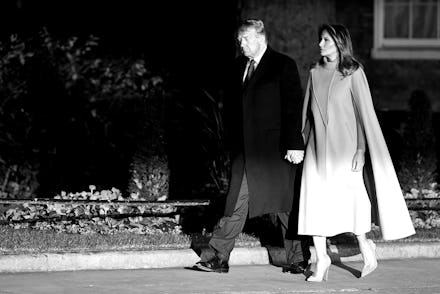A new court ruling brings us one step closer to seeing Trump's financial records

Donald Trump’s ongoing attempt to shield his financial records from view hit another snag today, when a federal appeals court ruled that House Democrats have the right to use congressional subpoenas to demand that banks hand over documents.
The U.S. Court Of Appeals for the 2nd Circuit declared that there was a “public interest” allowing the congressional subpoenas. It concluded that the house’s investigation “in pursuing their constitutional legislative function is a far more significant public interest than whatever public interest inheres in avoiding the risk of a Chief Executive’s distraction arising from disclosure of documents reflecting his private financial transactions."
So far, Trump has managed to prevent most bank records related to his businesses from becoming public, even as the Democrat-controlled House has ramped up investigations into his dealings.
Today’s ruling from the court upheld the investigative authority of the House. It demanded that Deutsche Bank and Capital One provide the requested documents. It also gave Trump a week to appeal the decision to the Supreme Court. In the ruling, written by Judge Jon O. Newman, the court declared that the House has been delayed in receiving the material it requested on April 11. “They need the remaining time to analyze the material, hold hearings, and draft bills for possible enactment,” Judge Newman wrote.
In a dissent, Judge Debra Ann Livingston wrote that Trump’s lawyers have “raised serious questions on the merits, implicating not only Congress’s lawmaking powers, but also the ability of this and future Presidents to discharge the duties of the Office of the President free of myriad inquiries instigated ‘more casually and less responsibly’ than contemplated in our constitutional framework.”
The investigation is being led by two House committees, Intelligence and Financial Services. They have requested over a decade of records related to Trump, his businesses, and his children Eric, Donald Jr. and Ivanka. In their requests for the documents, the committees cited as part of broad investigations into Russian money laundering and potential foreign influence involving Trump.
“As we have said previously, we remain committed to providing appropriate information to all authorized investigations,” said Deutsche Bank in a statement, “and will abide by a court order regarding such investigations.”
Many people believe that the banking records could contain record of financial impropriety, including possible connections to Russian interests. People have also said that the records could indicate that Trump understated the amount of money he earned from the 2017 tax cut. Deutsche Bank has loaned Trump’s company $364 million since 2012, according to the Washington Post.
Patrick Strawbridge, a lawyer for Trump, argued that the subpoena, which would produce records of every single financial transaction made by the Trump family, would be an “overbroad, nonpertinent attempts to reconstruct Plaintiffs’ [Trump’s] entire financial history.”
In response, the ruling acknowledged, “We have recognized that this loss of privacy is irreparable,” but made clear that the court believes the public has a right to know whatever it is the president is trying so hard to keep from becoming public.